-
MENASHE (Joshua Z. Weinstein 2017)
JOSHUA Z. WEINSTEIN: MENASHE (2017)
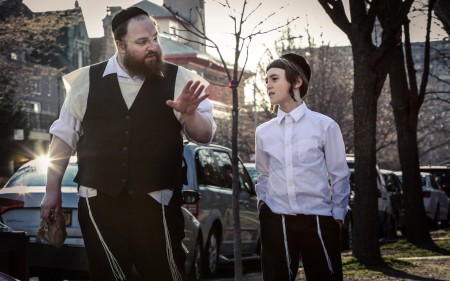
MENASHE LUSTIG AND RUBEN NIBORSKI IN MENASHE
A grieving Hasidic widower in Brooklyn
The setting is a very particular one, the Yiddish-speaking Hasidic community of Borough Park, Brooklyn. Mehashe (Menashe Lustig, playing a variation on his own life experiences) is a widower with a ten-year-old son named Rieven (Ruben Niborski). In the community, children are not supposed to be in the care of single men, so Rieven is living with Menashe's judgmental brother-in-law Eizik (Yoel Weisshaus). Another factor is that Menashe, who has a menial job at a kosher supermarket where the boss is as disapproving as Eizik, is impoverished, not a winner; Eizik sells real estate, and does well. Menashe very much wants to have Rieven with him. He does get Rieven for a while, but it's a tug of war. The fact is, Menashe seems a mess. He's urged to get a new wife as soon as possible, but he's disinclined, and this big sloppy man is no dreamboat.
There is a burlesque, comical aspect to this little tale. But it's also notable for its warmth and humanity. Essentially this is a story of love and loss. Documentary filmmaker Weinstein uses simple, no-nonsense methods,* and it seems uncertain where things are going for a while. But at the end, Menashe has gained some recognition - particularly from us, the viewers, and we realize that this is about grieving. Menashe is going through a process. He struggles to have the memorial service for his wife not at his brother-in-law's but at his humble abode, and, despite disasters, he succeeds. The event ends with the approval of the Rabbi (Meyer Schwartz)and the other men who come. When we see him standing tall walking down the street finally dressed in a proper Hasidic long coat and hat, no longer the sloppy shirt sleeves he's been in all through the film, we realize he is working through the grief and turning a corner toward self-possession and self-respect. He's becoming a mensch in his own eyes and acceptable material for a matchmaker, and we feel a lift.
Menashe is not only a culturally distinctive tale with documentary particularity but also a story with real slow-building emotional heft. Much is owed to the scenes of Menashe and Rieven together. Rieven is a lively boy, playful, unpredictable, unscholarly, a bit of a handful. He is happier with his father, but also wary when his father messes up, repeatedly. On the other hand Eizik is prissy and mean as well as judgmental. This film isn't simplistic, though. The Rabbi and Eizik come to recognize Menashe's emotional sincerity and turn out not to be as mean as they first appeared, as playing by the Hasiidic rule book made them look. Hasidic values are strict, but there is also warm-heartedness and joy.
This film shot among actual Hasidic people in Brooklyn, which is tricky, since the Hasidics don't even watch movies, let alone approve of acting in them. It had to be made somewhat on the sly. How Weinstein persuaded real Hasidic people to play all these roles is a bit of a mystery, but he spent several years making the film, and as a documentarian was familiar with ways of fitting in. This is one of those films where using non-professionals pays off. You could never make these people up, or recreate them with makeup.
One does't feel here the wholesale admiration of Jewish ultra orthodox life you get in Rama Burshtein's Fill the Void (NYFF 2012), but one's not getting a sense of tragic consequences as with the gay orthodox butchers in Haim Tabakman's bold and devastating Eyes Wide Open. When you read accounts like Lutser Twersky's Huffington Post article, "I Escaped Hasidic Judaism..." you wonder, and there are hints here, like a young woman complaining that she's being prevented from going to college. But, of course, every story need not directly critique the society it depicts. It's complicated.
Menashe, 79 mins., debuted at Sundance; also shown at Berlin and Cleveland, and screened for this review as part of the Film Society of Lincoln Center-Museum of Modern Art 2017 series New Directors/New Films. It's Weinstein's debut as a feature director. An A24 release: starting July 28, 2017.
_______________
*L.A. Times article by Steven Zeitchik describes making of the film.
Last edited by Chris Knipp; 06-20-2017 at 11:50 AM.
-
THE FUTURE PERFECT/EL FUTURO PERFECTO (Nele Wohlatz 2016)
NELE WOHLATZ: THE FUTURE PERFECT/EL FUTURO PERFECTO (2016)
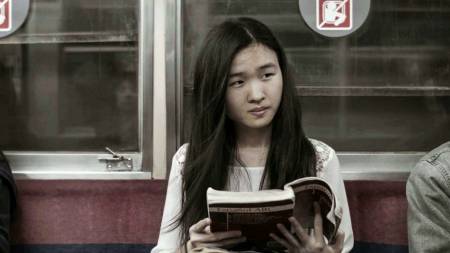
XIAOBIN ZHAN IN THE FUTURE PERFECT
"Apprendre une langue, c'est vivre de nouveau"
This film reminded me of Ionesco. He's said to have been inspired to write his Theater of the Absurd plays by reading dialogues in language textbooks. Nele Wohlatz creates a delicately surreal atmosphere by following newcomers to Argentina, a Chinese girl and an Indian man who have a romance while communicating only in Spanish, of which they have a limited knowledge. At the same time I also thought of the folksy approach to immigrant interaction we get in the classic story by Leo Rosten, "The Education of H*Y*M*A*NK*A*P*L*A*N." This is a charming and original film.
Fired from a deli because she doesn't know enough Spanish words to serve customers, Xiaobin finds work at a different Chinese grocery store where her knowledge of mandarin is sufficient to make her useful. There she meets a young Indian man called Vijay (Saroj Malik). She's pretty and young, and Vijay is immediately interested. Xiaobin goes against her relative, who says they're going back to China and studying Spanish is a waste of time. Xiaobin saves up enough money from her job to pay for language classes. For her it's an opportunity to break away from the restrictions of her traditional family, to expand her future possibilities and break free of the more dire restrictions of being a foreigner.
Vijay comes a courting, a role that's defined largely just by body language, because while his Spanish is limited, Xiaobin's is even more rudimentary. Vijay almost at once declares to Xiaobin that he loves here and wants to marry her. He is barred by limited Spanish on both sides from conducting an elaborate courtship, but he's also under pressure from his family to find a wife. She knows this is going too fast, but she also lives in the fantasy. Speaking a new language makes it all feel like just a game and things move fast because there are no linguistic complexities to slow them down.
The blurb calls this an "idea-rich work." Indeed: the subjects of simple language and complicated situations, and simple situations complicated by language, lead inevitably down the road of linguistic philosophy. Do we know more than we can say? Because we can say something does it mean that we know something?
The conceit of this short feature grows out of moving along to better knowledge of the target language. It's that as the student moves toward conditional verbs, she also moves into consideration of multiple possibilities in her own young life. The film is made up of a series of short scenes with dialogue after the manner of language learning texts. A special guest is the talented and multilingual young actor Nahuel Pérez Biscayart, who arrives speaking fluent and very convincing mandarin. But he says he's just acting. Apprendre une langue, c'est vivre de nouveau, goes the saying: speaking a new language is a performance, taking on a new role and a new life.
There are many opportunities for drollness and for romantic hints. At the same time it's hard to sustain these things for very long. And the pastel-pale color processing of the film gives it a kind of wanness. But this little film is as original as it is universal.
The Future Pefrect/El futuro perfecto, 65 mins., debuted at Locarno 2016, winning the Best First Feature prize. It was screened for this review as part of the Mar. 2017 FSLC-MoMA New Directors/New Films series.
Last edited by Chris Knipp; 03-10-2017 at 05:03 AM.
-
4 DAYS IN FRANCE/JOURS DE FRANCE (Jérôme Reybaud 2017)
JÉRÔME REYBAUD: 4 DAYS IN FRANCE/JOURS DE FRANCE (2017)
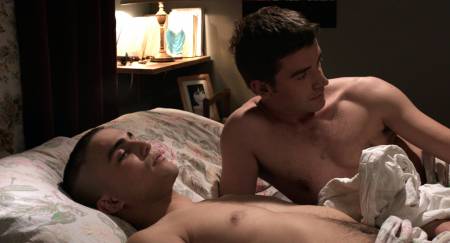
MATTHIEU CHEVÉ and PASCAL CERVO IN 4 DAYS IN FRANCE
A French gay road movie with oddballs and Grindr
Gay viewers who expect this film to be a round of hot erotic encounters - or an intense melange of mystery and explicit sex like Giraudie's Stranger by the Lake - will be disappointed. Filmmaker Jérôme Reybaud has made a road movie with a decidedly gay focus, but his scope is more varied and bemused. His protagonist, 36-year-old Pierre Thomas (Pascal Cervo), though well primed for a tour of gay France with an attractive new white Alfa sedan and a smart phone loaded with Grindr, the worldwide gay hookup app, is as much as anything on a "fugue," as the French call it, an escape and a wild ramble. He's run off in the night from his Paris lover Paul (Arthur Igual) and gone wandering. After he fails to show up for a production of Cosi fan tutte for which Paul got them €150 seats, Paul goes in frantic pursuit of Pierre, using Grindr in turn as a search tool. As for Pierre, he goes where chance takes him, running into oddballs and old ladies more than hot men. This movie is whimsical, elegant, pretty, literary, a little too pleased with itself - and not really all that sexy. It requires some patience. In compensation it has humor, variety, poetry. And some sex.
Grindr is a geographical-locator app gay men list themselves on: options pop up wherever you go, and the use of it makes this look for a minute like an updated French country-wide version of John Retchy's pre-AIDS novel Numbers, in which a narcissist a tad past prime goes on a frantic sex tour of gay L.A., racking up as many sweaty, sperm-soaked encounters as possible in a ten-day period. Pierre starts out promisingly with Matthieu (Mathieu Chevé), a cute young guy in Bourges, who wants Pierre to pick him up on his way back and take him to Paris. But Pierre has no plan to return to Paris. He has no plan. He tells Matthieu to go to Paris on his own.
Pierre himself isn't wholly on his own. He calls his aunt, a theatrical grande dame, who cites Breton: "Hit the road." As someone else, a salesman (Bertrand Nadier) whom Pierre kisses, then masturbates thinking of through a wall, says, "only a car can give you certain sensations" of the land. Pierre becomes an automotive flaneur, a leisurely wanderer. When Matthieu gives him a package and a note for a lady up in the mountains, he later delivers it. Later he encounters a series of people, including a petty thief (female, Lætitia Dosch) who takes some of the most prized possessions he has with him; a fat old barkeep who wants only wordless, impersonal sex. He has a pretty, odd young godson, obviously gay, who haunts public toilets and memorizes facts about French towns. Pierre comes across a former teacher, now a mere provincial bookseller (Nathalie Richard). There are various ladies of a certain age - no young pretty ones. But Paul, hot on the trail, gets a blow job from a plain woman (Corinne Courège) working for a roadside fast food joint called Happy Dough (La Pâte à Bonheur) - out of kindness, because she won't take the mere €5 she's asking as a gift without the service.
4 Days in France has handsome cinematography, rich in painterly landscape, by Sabine Lancelin; the editing includes jump cuts expressive of Pierre's rudderless travels. The score includes classical excerpts, some opera. And a happy ending.
4 Days in France/Jours de France, 141 mins., debuted in the directors series at Venice. It opens in French cinemas 15 Mar. 2017. (It scored high with critics: <a href="http://www.allocine.fr/film/fichefilm-246427/critiques/presse/">AlloCiné</a> 3.6.) Screened for this review as part of the New Directors/New Films 2017 series (Lincoln Center/MoMA). [Mike D'Angelo gives this film a 71, and has wound up putting it at number 10 in his favorite films list for 2016.]
Last edited by Chris Knipp; 03-02-2018 at 09:03 PM.
-
AUTUMN, AUTUMN/CHUNCHEON, CHUNCHEON (Jang Woo-jin 2017)
JANG WOO-JIN: AUTUMN, AUTUMN/CHUNCHEON, CHUNCHEON (2017)
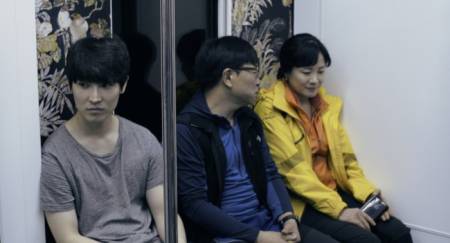
WOO JI-HYUN, YANG HYUNG-JU, AND LEE SE-RANG IN AUTUMN, AUTUMN
Disappointment and awkwardness in a provincial town
Not unlike Hong Sang-soo, who surely must be something of an influence, Jang Woo-jin's film is about a trip to a new place, with a lot of conversations. It's divided up into two story lines, which don't connect except that the three characters involved, a couple on a travel date who met on the Internet, and a young guy returning home after failing to get a job he sought in Seoul - and hey go to some of the same places without running into each other. The three are sitting next to each other in a train compartment heading from Seoul to the provincial town of Chuncheon, a shit hole, the disappointed young guy Ji-hyun (We Ji-hyun) says, but a spot notable for its pretty landscapes to Hyung-ju (Yang Hyung-ju) and Se-rang (Lee Se-rang); she used to live here and has pleasant memories of the place. The Korean title of the film, "Cuncheon, Chuncheon," signals its bipartite structure: it's two Chuncheons, that of the would-be couple, a liaison that ultimately doesn't work; and that of the sad and frustrated Ji-hyun, whose high school dreams are crushed.
We hear Hyung-ju and Se-rang talk on the noisy train, but don't gather what's going on with them till later. We follow Ji-hyun as he stands that night on a bridge, then next day ferries to a temple to pray and then works in a friend's restaurant. From them he gets the phone number of a friend, Min-jung (Kim Min-jung), whom he's run into earlier, whose mother's funeral he was to attend, but couldn't because he missed the ferry back to Chuncheon. In what seems the most arresting scene in the film, Ji-hyun talks to his friend with the cell phone sitting on the ground. He remembers old times and weeps. His friend tells him he's given up singing as a career; he didn't have what it takes. But Ji-hyun begs him to sing a song for him, which he does, despite saying he doesn't usually sing for guys. It's a surprisingly emotional moment, despite there being nothing but Ji-hyun and a cell phone in the scene. The actor playing Ji-hyun, charming and sad, impresses.
Hyung-ju and Se-rang are harder to watch. They go to some of the same places as Ji-hyun, the temple and a couple of restaurants, and a hotel, very awkward, like Ernest Borgnine and Betsy Blair in the 1955 Marty. When they go to a hotel, Hyung-ju has to go outside while Se-rang takes a bath, because the bathtub is right out in the room. As time goes on, the somewhat older Hyung-ju declares himself well leased with Se-rang, but it emerges that she doesn't return the feelings, even though, by the time they admit the food at an outdoor restaurant she remembers isn't very good, and wasn't in the past either.
Michael Sicinski, in his review on Letterboxd, suggests that Jang's aim is "humanizing embarrassment," a process by which we "become invested in gradually [accruing] disappointment." (This fits with the comparison to Marty.) In his Berlinale review, D.Kat Griggs focuses on the way the landscapes and locations work in relation to mood and action and holds that the film's message lies in its "visual representations, the sounds, the expressions, and the feeling of the interaction." Both these interpretations may be valid, and clearly Autumn, Autumn is sophisticated and conceptually ambitious. But this is a low-budget film, and its cheap, grainy look I found off-putting, the filming of most of its scenes (except perhaps Ji-hyun's phone call) unattractive and plodding. Jang Woo-jin was only around 30 when he made this film, however, and he could move on to more successful and polished work.
Autumn, Autumn/Chuncheon, Chuncheon/ 춘천, 춘천, 78 mins., debuted at the Berlinale Forum. Screened for this review as part of New Directors/New Films (FSLC/MoMA) 2017.
Last edited by Chris Knipp; 03-10-2017 at 05:25 AM.
-
THE DREAMED PATH/DER TRAUMHAFTE WEG (Angela Schanelec 2016)
ANGELA SCHANELEC: THE DREAMED PATH/DER TRAUMHAFTE WEG (2016)
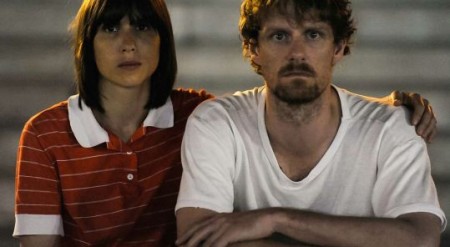
MIRIAM JAKOB AND THORBJÖRN BJÖRNSSON IN THE DREAMED PATH
Couples troubles
This Berlin School film of two couples who intersect somehow thirty years apart at first satisfies with its formal rigor and narrative clarity - until it becomes hard to follow and largely lost me. I did think of Godard but there is a harsh German severity. Its people treat each other cruelly, it treats the audience cruelly.
The film starts in Greece with a couple roughing it in the Eighties (the fall of the Berlin Wall will come up). They are Theres (Miriam Jakob), who's German, and Kenneth (Thorbjörn Björnsson), who's English (though the actor isn't). They sing "Wimaway" ("The Lion Sleeps Tonight") as seated buskers for cash, and he uses change to call home, learning his mother is deathly ill. He goes home, where he and his blind father (Alan Williams) mercy-kill his mother using a large dose of morphine (Kenneth has been a heroin user, and so knows where to get drugs). Theres gets a scholarship to study in Berlin. When he turns up in Berlin, she walks past him. He disappears, leaving his dog chained in the rain in a square. She is now involved with a young German man who works in a hospital.
The Dreamed path is shot in tight 4:3 ratio, and its shots are similarly often pared down eschewing back-and-forth coverage of conversation, showing often one person and only part of the body of the other, with head-on shots of faces and a lack of affect and a several-second delay of response in dialogue. This gives an effect of clarity and focus.
Speaking of clarity and focus, that comes even in the blind father. "Are you completely blind now?" Kenneth asks, and his father says no, and explains exactly what he can see. No colors, but forms moving, and himself as a spot in the mirror. "I recognized immediately that it was you," he tells his son.
There is an odd, haunting scene of kids bathing in an indoor pool. The opening shot is of a couple dozen kids clustered together at the edge of the pool - no preparation. It's arresting. Then starting with one bolder boy they all lower themselves (not diving) into the water. Then, we see a boy in a wheelchair in the distance. He unlocks himself from being hooked into the wheelchair, slides forward - and flops boldly into the water. Later he's helped out and there's a spot like a wound on one leg. "Use spit, that will disinfect it," says one kid, and a girl licks the wound.
In the main second plot section middle-aged actress Ariane (Maren Eggert) splits with her husband David (Phil Hayes), an anthropologist. There is a little girl (Anaïa Zapp) who hurts her left arm and it's put in a cast by a doctor who asks her if she likes sports. She says she liked football. At the end she is by herself kicking a ball around. Theres appears wearing the same red top and black and white skirt she wore in the first scenes. Kenneth has come to Berlin, and it's raining. They look the same.
What gives? Is Schanelec telescoping time? I could not parse these latter sequences. The early ones between Theres and Kenneth and Kenneth and his father and dying mother are clear and memorable. In a longer piece about the director by Blake Williams in Cinema Scope Online, he calls this "perhaps the freshest and most profoundly emotional film that [Schanelec has] ever made." Vadim Rizov says he ilked Schanelec's earlier Marseilles, and The Dreamed path is "a hilariously severe film, The Marble Index of Bresson-damaged High European Art Cinema, in which Schanelec sort of gives you enough information to get oriented at the start before systematically adding more and more characters and incidents for whom all context has been elided."
The Dreamed Path/Der traumhafte weg, 86 mins., debuted at Locarno 9 Aug. 2016.Seven other international festivals including Toronto, Hamburg, Vancouver, Cologne and Mar del Plata. It was screened for this review as part of the Film Society of Lincoln Center-Museum of Modern Art 20117 New Directors/New Films series, Mar. 2017.
Last edited by Chris Knipp; 03-10-2017 at 05:29 AM.
-
HAPPY TIMES WILL COME SOON/I TEMPI FELICI VERRANNO PRESTO (Alessandro Comodin 2016)
ALESSANDRO COMODIN: HAPPY TIMES WILL COME SOON/I TEMPI FELICI VERRANNO PRESTO (2016)
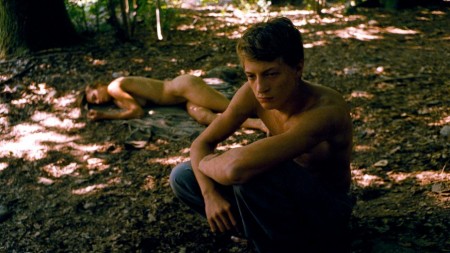
SABRINA SEYVECOU AND ERIKAS SIZONOVAS IN HAPPY TIMES WIIILL COME SOON
Of wolves and men
The Italian film avant-garde may have a penchant for local legends and roughing it on the land. One might see those elements in Micheelangelo Frammartino's much admired Le quattro volte (NYFF 2010) and also in Simone Rapisarda Casanova's The Creation of Meaning (ND/NF 2015)]. The same goes for Alessandro Comodin's Happy Times Will Come Soon/i tempi felici verrranno presto - but this time ingredients are thrown down, but don't fit together. Clarence Tsui puts it politely when he says in his Hollywood Reporter Cannes review that Comodin is "an innovative filmmaker yet to master the art of combining wildly diverse ideas into a cohesive whole."
The elements are a couple of young men hiding out in a forest, a local legend of a wolf that adopted a pretty girl, and a young women in the area who gets lost. There is also digging holes and going down into holes. And narrative logic is regarded lightly. The two young men are Tommaso (Erikas Sizonovas) and Arturo (Luca Bernardi). They trap a rabbit (by digging a hole and perching a big rock over it), find a dead man and take his rifle. Perhaps all this is meant to be happening at an earlier time. It somewhat looks like it - except that the guys are wearing modern day charity shop clothes and good, up-to-date hiking shoes. They play around foolishly with the rifle. With this turn, Comodin tips his hand. We know things won't go well. Tommaso and Arturo are soon surrounded and shot. All this action is staged and filmed in an effectively visceral style. Tommaso and Arturo's exhausting run through wood and hill, followed by a dogged shaky cam, is pure physicality. But the lack of explanation or context limits our engagement.
In a more documentary-style passage, several men recount for the camera versions of a local tale about a wolf that adopted a lost girl and took her away to the woods and protected her. She was however, pale and unhealthy and eventually died, and the wolf pined for her. This storytelling is obviously an inspiration for the film but its literalness disrupts the spell cast by the rough action.
Later we return to the woods and follow Ariane (Sabrina Seyvecou). After riding on a tractor with a pipe-smoking older dude, she sets out on her own and gets lost in the woods. Like the two guys on the run, she also strips and takes a dip in the muddy lake; only she mucks about in the mud; they just dove off a rock.
Then, to our surprise, Ariane finds Tommaso, hiding in a hole. They have sex. Then it looks as if he may have killed her. He winds up in a nice prison - and Ariane comes to visit him. They touch through a separation grill that, final titles say, was constructed for the film and isn't the real one.
In the second half, Tommaso has presumably become the wolf's avatar and Ariane a version of the folk tale girl, but the film's lack of connective tissue leaves these equivalences hanging. After this film's Cannes Critics Fortnight debut Variety ran a review by Guy Lodge where he called it "an elegantly mounted but effortfully cryptic foray into narrative filmmaking. . ."
The film was shot in Cuneo, in the sparsely populated Val d'Aosta, northwestern Italy, where according to the 35-year-old Comodin, there indeed are wolves. Comodin's first feature, the 2011 docudrama Summer with Giacomo, won the Golden Leopard at Locarno.
Happy Times Will Come Soon/I Tempi felici verranno presto, 102 mins., debuted in Critics Week at Cannes; also other festivals including Rio, Vienna, and Rotterdam; at Mexico City it won the Puma Prize for Best Film. Screened for this review as part of the FSLC-MoMA 2017 New Directors/New Films series.
Last edited by Chris Knipp; 03-10-2017 at 05:39 AM.
-
PENDULAR (Júlia Murat 2017)
JÚLIA MURAT: PENDULAR (2017)

Hazards of cohabitation for an artist couple
Júlia Murat's previous film, the 2011 Found Memories, was a delicate semidocumentary meditation about a fading town and its customs and people. It would be nice to think of her new feature, Pendular as a "huge leap forward," as Mike D'Angelo says he does in his Letterboxd discussion. But to begin with while D'Angelo walked out on Found Memories, I liked it; it's low-keyed, but that's the point: it seemed to me haunting and beautiful.
Pendular certainly is a very different kind of film, a straightforward drama about a heterosexual relationship. Ele (Rodrigo Bolzan), a sculptor, and Ela (Raquel Karro), a dancer/choreographer, are an artistic couple who cohabit a huge live-work space in a semi-derelict industrial building, and while their relationship is sexy and relaxed, it's also by implication and inevitably uneasy and competitive: they work where they live (the spaces never seem to me very clearly defined; it's only half-way through that it's clear they have a bedroom away from the open spaces).
Murat struggles with the old problem of showing us what can't be shown - the creative process. There's an imbalance perhaps because Karro is a "more forceful" screen presence (as D'Angelo says). But aggressiveness isn't the only way of getting our attention. Bolzan holds his own a lot of the time with his sad and gloomy looks. Murat likes to show her dancing, and his sculptures and sculpture-making never really come to life. But that's intentional. He's supposed to be having a dry period or a personal crisis. Maybe he doesn't like that she is always having intimate, touchy-feely dances with a younger male partner. And then, Ele wants to "give" Ela a baby, and she doesn't want one. Maybe it's just pretty obviously not a good idea for two artists to be working in the same open space, especially when they're a couple.
The film goes through meandering and repetitive efforts to show us "artists". This includes the couple's bohemian friends, who periodically get together for mixed games of soccer in a courtyard. The friends aren't developed as characters, except, slightly, the plump man who's the critic "friend" to whom Ele foolishly confides that he doesn't know where in the hell he is going with his new work, and the critic tells him he's going nowhere. Is Ela's dancing going anywhere? There is nothing special to prove that, really, other than the fact of those sexy dances with the young male partner. Would it have been too obvious to show Ele noticing this?
With all the junk and sculptures (though what Ele's style is isn't ever clear except that he works big) and Ela's props for her dances it seems Murat is trying to tell by showing, rather than to act out a narrative. The sculptures show Ele is ineffectual because he's not getting them right, not putting together a body of new, consistent work. The big space that Ela's filling with dancing is a mockery to him, who's stuck. But here's another problem: if it's hard to show creativity, it's even harder to illustrate creative blockage.
I frankly found this movie grating. And as so often with movies about artists it makes one wonder if they know what they're talking about, and they're falling into cliché. This is of course also a war of the sexes, and while frontal nudes scenes show Bolzan is perfectly well endowed, there's no doubt his character is pussy-whipped and D'Angelo is right: lots of passive-aggressive stuff is going on. Pendular is flailing, and lacks economy.
Pendular, 108 mins, debuted at the Berlinale, where it won the FIPRESCI Award for the best film in the Panorama section. Screened for this review as part of the 2017 FSLC/MoMA series, New Directors/New Films.
Showtimes Walter Reade Theater 24 Mar. 6:30 p.m.; MoMA 26 Mar. 6:45 p.m.
Last edited by Chris Knipp; 03-10-2017 at 05:43 AM.
-
BOUNDARIES/PAYS (Chloé Robichaud 2016)
CHLOÉ ROBICHAUD: BOUNDARIES/PAYS (2016)
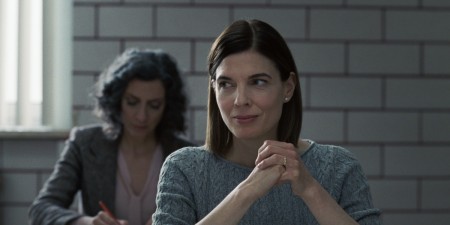
MACHA GRENON IN BOUNDARIES/PAYS
French Canadian women-in-politics film is dutiful, a bit flat
Chloé Robichaud, a French Canadian filmmaker, wants to show us women in politics. In her film Pays ("Countries"), called Boundaries in English, the focus is on three women at a conference about a mining contract involving Canada and a fictitious nearby island country called Besco. The women are: Danielle Richard (Macha Grenon), Besco's distinguished-looking woman president; Emily Price (Emily VanCamp of the Captain America movies), an impressive and cute blonde bilingual moderator; and Félixe (Nathalie Doummar), a promising and - in her case especially important - pretty young intern with the Canadian ministry, who's just helped manage a successful political campaign.
The men are shits, terrorists, or sex partners. The shits are the high government officials and the fat lobbyist who try to force Besco to accept the mining company and its crooked, polluting ways because the country needs the jobs and money the mining will bring. The terrorist is a rural nationalist and anti-vegetarian who momentarily paralyzes everyone near the film's end. The sex partner is primarily Vincent (Alexandre Landry), a tall, fit young member of the bargaining team who, on a drunken night, Félixe takes to bed. The women do their power things and also women things. Félixe's woman thing is to get laid (and sick drunk); the lady president's is to have to tend to a young daughter who gets a broken leg; and Emily Price has it the toughest: she must cope with a soon-to-be ex who's negotiating to get total custody of her adorable little long-haired blond son.
We are told at the end that Danielle Richard's effort to exclude the mining corporation and develop a mining coop à la Brazil was successful, and she was reelected; Félixe went into independent charitable work and was successful; and Emily became part of a global team doing good things and was successful. Nice outcomes, but a little bit generic, to put it mildly.
Pays is neatly constructed, taking place during only a few days. And the austere, pristine locations of St. John's in Newfoundland and Fogo Island, Labrador that stand in for Besco are beautiful. But as Stephan Dalton politely points out in his Toronto Hollywood Reporter review, this movie is "an interesting idea let down by lukewarm execution." It's "underpowered and unfocused," and "not the strong sophomore film it might have been."
The political negotiation sessions are sometimes downright boring: you so much wish, particularly in depicting the stuffy and boorish males, that Robichaud had not written this to be so much by-the-numbers - that she had ramped up the humor and the excitement. She could have tweaked the plot to make those negotiations really intense and suspenseful like the recent Wall Street films - one of which, Meera Menon's Equity, like J.C.Chandor's great Crash film Margin Call (ND/NF 2011), is a smart intense step-by-step thriller - but in the case of Equity, has women as its main characters. Boundaries is (mostly) watchable, but it lacks the pizzaz, wit, and smarts a subject like this has got to have to make a good movie. Interesting to watch French Canadians operating 95% in French in a story like this, though.
Boundaries/Pays, 100 mins., debuted at Toronto; it failed to get into Cannes in rough cut form, Dalton reports. Screened for this review as part of the 2017 Film Society of Lincoln Center-Museum of Modern Art joint series, New Directors/New Films.
Last edited by Chris Knipp; 03-07-2017 at 09:52 PM.
 Posting Permissions
Posting Permissions
- You may not post new threads
- You may not post replies
- You may not post attachments
- You may not edit your posts
-
Forum Rules





 Reply With Quote
Reply With Quote







Bookmarks